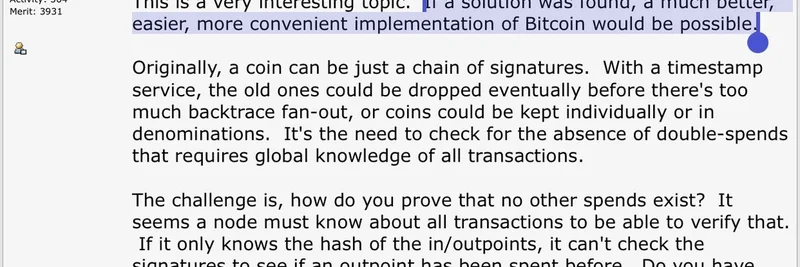If you've been following the crypto space lately, you might have noticed some heated debates between Bitcoin purists and fans of privacy-focused coins like Zcash. A recent thread from Mert, the CEO of Helius Labs, sheds light on why some Bitcoin maxis are feeling threatened by Zcash's rise. Let's dive into it.
The Thread That Sparked the Discussion
Mert (@0xMert_ on X), known for his work in Solana infrastructure, posted a screenshot of an old forum reply from Satoshi Nakamoto himself back in 2010. In it, Satoshi discusses the core mechanics of Bitcoin and ponders whether zero-knowledge proofs (ZK proofs) could solve some of its biggest challenges.
In the post, Satoshi explains that a Bitcoin coin is essentially a chain of digital signatures, timestamped to prevent double-spending. But verifying that no double-spends have occurred requires nodes to have global knowledge of all transactions. He wonders aloud: How can you prove no other spends exist without revealing everything? Satoshi admits it's tricky to apply ZK proofs here, which are cryptographic methods that let you prove something is true without showing the underlying data.
Mert ties this to the current drama, saying Bitcoin maxis are "violently coping" about Zcash—a coin with a market cap around $3 billion—because it embodies what Satoshi dreamed of: a better, more private version of Bitcoin using ZK tech.
What Are Zero-Knowledge Proofs, Anyway?
If you're new to this, zero-knowledge proofs sound like magic, but they're a real cryptographic breakthrough. In simple terms, ZK proofs allow one party to prove to another that a statement is true without revealing any extra information. For example, you could prove you know a password without actually typing it out.
Back in 2010, ZK tech was cutting-edge and not fully practical for something like Bitcoin. Satoshi noted the difficulty in using it to verify the absence of double-spends without nodes seeing every transaction. Fast forward to today, and advancements have made it possible—enter Zcash.
How Zcash Builds on Satoshi's Ideas
Zcash, launched in 2016 as a fork of Bitcoin, takes privacy to the next level with zk-SNARKs (a type of ZK proof). This lets users shield transactions, hiding amounts, senders, and receivers while still proving the transaction is valid and no double-spending occurred. It's like having Bitcoin's security but with built-in privacy.
Mert points out in his follow-up: "At that time, ZK was extremely novel... well you can now." Zcash proves it works, and that's why some Bitcoin enthusiasts see it as a threat. If Zcash can offer better privacy without sacrificing decentralization, does that make it the "much better, easier, more convenient" Bitcoin Satoshi envisioned?
Replies to the thread echo this sentiment. One user quips, "zcash is a better, more convenient implementation of bitcoin - Zatoshi Zakamoto." Others note that maxis are "stuck in 2010," while some defend Bitcoin's simplicity, arguing that adding ZK could complicate things without trusted setups (though Zcash has evolved past that with updates like Halo).
Why This Matters for Meme Tokens and Beyond
While Zcash isn't a meme token itself, its ZK innovations have huge implications for the meme coin world, especially on fast chains like Solana (where Helius Labs operates). Privacy features could protect traders from front-running or doxxing in high-volatility meme markets. Imagine launching a meme token with shielded transactions— it could level the playing field and attract more users wary of transparent ledgers.
This thread reminds us that crypto is about evolution. Satoshi wasn't rigid; he was open to ideas that could improve Bitcoin. As blockchain tech advances, coins like Zcash show how ZK can enhance privacy without reinventing the wheel.
If you're into privacy coins or just curious about crypto's roots, check out the full thread on X. What do you think— is Zcash the future Satoshi hinted at? Drop your thoughts in the comments!



